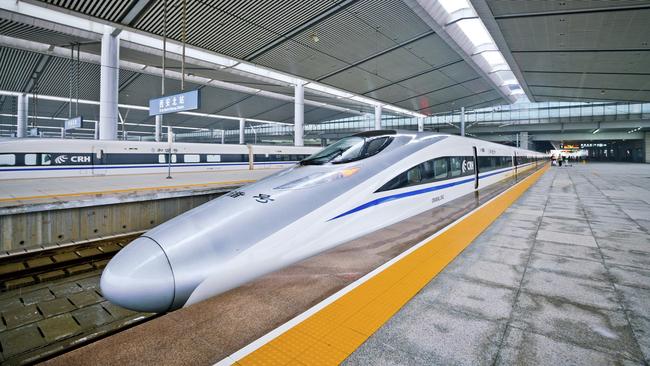
For Xi, this is no ordinary infrastructure project and his obvious frustration with Putin’s actions helps explain the lack of clarity in China’s response to the Russian invasion of Ukraine.
When at the 2017 Ninetieth National Congress of the Chinese Communist Party Xi was ranked with Mao Tse-tung and Deng Xiaoping in the party’s constitution, Belt and Road infrastructure project was also incorporated into the document.
Belt and Road aims to connect Asia, Europe, the Middle East and Africa with a vast logistics and transport network, but the centrepiece of the project is the massive rail link connecting the two oceans
If at the Twentieth National Congress, to be held later this year, it emerges that Belt and Road has been delayed indefinitely, it will be a devastating blow to the high standing of Xi Jinping.
He will lose face.
A fast train line has already been completed between China’s Pacific coast and its ancient capital Xian. Currently it is possible to complete the train journey from Xian to Europe but it is slow.
Using the best route, a fast train journey from Xian to Brussels or other European ports must pass through Kazakhstan, Russia and Ukraine.
Russia is now a European (and global) pariah so there is no way Europeans will allow a fast rail line to the Atlantic that passes through Russia or a Ukraine that is not totally independent.
Ironically. over time there may be Chinese pressure for Putin to go in order to restore a centrepiece of the Chinese Communist Party constitution.
In the last 2000 years only one country has established a global transport network – the British Empire. Once China links the Pacific to the Atlantic this would then be the base for a British Empire-style network, making China only the second country to achieve such a feat. But Xi has always known he needed the support of both Russia and Ukraine.
Prior to the attack on Ukraine, Xi was very supportive of Russian long-term territorial ambitions. But that does not mean he supported bloody wars to achieve them. Over the last five years Russia has been reluctant to approve a train through its territory until the situation in Ukraine was resolved. China could not negotiate meaningfully with Ukraine because that would have put Russia off-side. With the Twentieth Congress approaching, the situation needed a resolution.
We will never know the details of the negotiations between Putin and Xi at the Winter Olympics in Beijing, plus subsequent conversations. Xi would have known that a drawn-out war on Ukraine could imperil the his Communist Party constitutional pillar.
Almost certainly when the initial Russian troop build-up started, Putin and Xi were hoping that the display of massive Russian military force would cause Ukraine to come to the negotiating table. But it didn’t work.
Then Russia devised a series of artificially created border disputes, but US intelligence got wind of them, and the US was able to announce what Russia was going to do before it took the actions.
The danger posed by those leaks caused the head of Russia’s foreign intelligence service, Sergei Naryshkin, to actually hedge his public support for Putin’s Ukraine actions before coming into line.
When the stunts failed, Putin hoped that the actual display of such a huge army on its doorstep would cause Ukraine to agree to Russian demands. Again he failed.
When the invasion started he hoped the Ukrainian army would surrender. Failed again.
Then he hoped for a fast victory. It’s been a very bad start and Europe has a big refugee problem. Putin now faces an prolonged, globally publicised guerrilla war.
Each of those Putin failures was an indirect blow to Xi and China which kept calling for negotiations.
XI, facing a quandary, did not endorse the Russian actions but did not oppose them. He looked indecisive.
The publicity and photographs of the killing of Ukrainian people has horrified Europe and the rest of the world.
The Russian Grand Prix has been cancelled and Russian international sports people are not supporting their President. Irrespective of the outcome it will take a long time to repair Russia’s pariah standing in the world. Ukraine has agreed to talks but any resolution unfavourable to Ukraine while the invasion is taking place will be seen as a fraud.
Earlier, China explained to Kazakhstan, Russia and Ukraine that the massive global superhighway would enable all three countries to establish factories, rural industries and tourist facilities near the line, which would deliver great prosperity.
For example, the Russian Olympic city of Sochi, which has never been able to capitalise on the vast sums invested in the facilities, would be an obvious beneficiary. Instead Sochi has now lost its Grand Prix.
The world fury at Russia will have shocked China and will almost certainly cause a revision of whatever plans China had to invade Taiwan. A Chinese invasion of Taiwan and the inevitable guerrilla warfare would trigger an even bigger world reaction than we have seen in the Ukraine.
The Communist Party constitution is in fact aiming to make China the world’s pre-eminent trading nation via Belt and Road. If China becomes a Russian-style pariah because of an invasion of Taiwan, then it will be impossible to achieve that ambition.




By invading Ukraine, Russian President Vladimir Putin has imperilled a pillar of Xi Jinping’s Chinese presidency – the massive 9000km fast-train project linking the Pacific and Atlantic oceans.